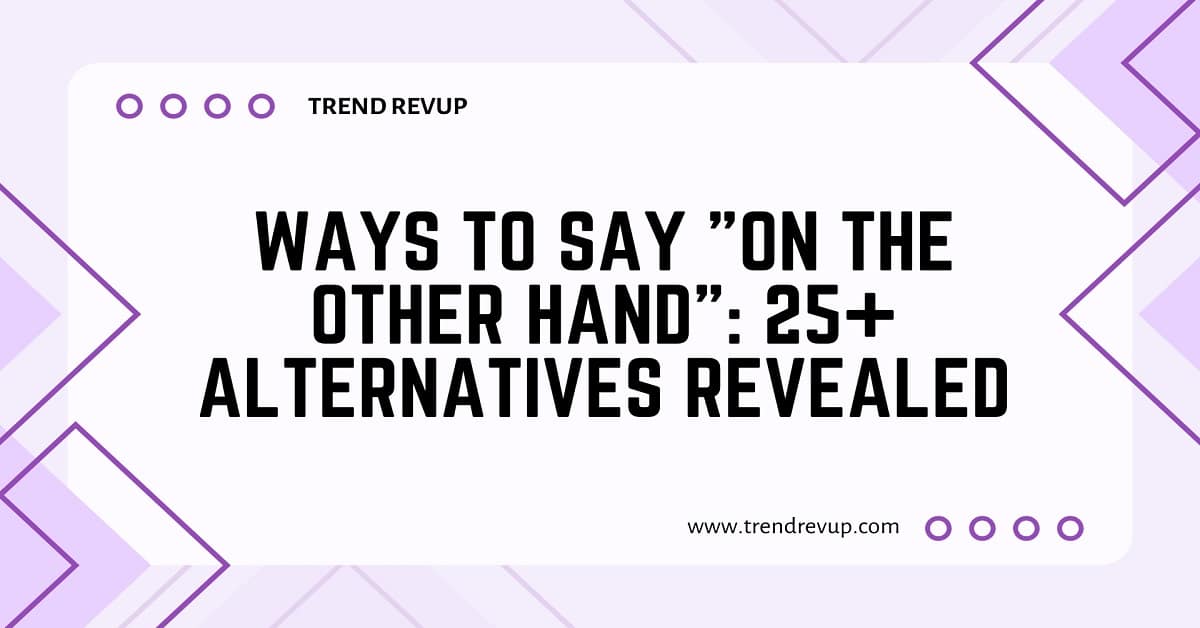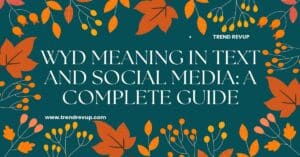Ways to Say “On the Other Hand” can completely transform how you express contrasting ideas without sounding repetitive. If you’re tired of using the same old phrase in conversations, emails, or even essays, you’re not alone. The good news? There are plenty of fresh and engaging alternatives that can make you sound more confident and polished.
Think about it you want your words to flow naturally, keep your reader or listener hooked, and still get your point across clearly. That’s exactly what you’ll discover here: practical, real-life expressions you can start using right away.
What Does “On the Other Hand” Actually Mean?
Before we go gallivanting through the garden of alternatives, let’s take a moment to understand what we’re actually replacing here. “On the other hand” is what linguists call a contrastive conjunction – basically, it’s a fancy way of saying “but wait, there’s more” or “hold your horses, let me present the flip side.”
Think of it as the verbal equivalent of a courtroom drama where the lawyer dramatically pauses and says, “But what if I told you…” It’s your way of introducing an opposing argument, a different perspective, or simply acknowledging that life isn’t as black and white as we’d sometimes like it to be.
The phrase literally comes from the image of holding something in one hand and something else in the other – weighing your options, if you will. It’s been helping people present balanced arguments since way back when people actually used scales with two sides instead of just saying “that’s heavy, dude.”
The Classic Alternatives: Your Bread and Butter Options
Let’s start with the tried-and-true alternatives that are like the reliable friends in your social circle – they show up when you need them and never let you down.
However
“However” is like the sophisticated cousin of “on the other hand.” It’s got that formal education vibe but isn’t too stuffy for everyday conversation. You can drop it into emails without sounding pretentious, and it works beautifully in both spoken and written English.
Example: “I love pizza. However, my pants seem to disagree with this life choice.”
Nevertheless
This one’s got some serious gravitas. “Nevertheless” is what you use when you want to sound like you’re making a declaration from a mountaintop. It’s perfect for those moments when you need to acknowledge a point but then steamroll right over it with your counterargument.
Example: “The weather forecast predicts rain. Nevertheless, I’m wearing my lucky flip-flops to the outdoor wedding.”
Conversely
“Conversely” is the word equivalent of doing a complete 180. It’s not just presenting another side – it’s flipping the entire script and showing the exact opposite perspective. Use this when you want to sound like you’ve got your debate team hat on.
Example: “Some people think cats are aloof and independent. Conversely, my cat follows me to the bathroom and has separation anxiety.”
The Casual Cool Kids: Relaxed Alternatives for Everyday Chat
Sometimes you need alternatives that won’t make you sound like you’re delivering a TED talk at the coffee shop. These are your go-to options for keeping things breezy while still sounding thoughtful.
That Said
This phrase is like the perfect denim jacket of transitions – it goes with everything and never looks out of place. “That said” acknowledges what came before while smoothly introducing your contrasting point.
Example: “I absolutely love sleeping in on weekends. That said, I somehow still wake up at 6 AM every Saturday like I’m programmed by some cruel internal alarm clock.”
Then Again
“Then again” has this wonderful “wait a minute” quality to it. It’s like your brain just remembered something important and wants to share it with the class. Perfect for those lightbulb moments when you realize there’s another angle to consider.
Example: “I should probably start eating healthier. Then again, have you seen the new donut shop downtown? They have cronuts!”
Having Said That
This one’s got a nice reflective quality, like you’re pausing to consider your own words before presenting the counterpoint. It shows you’re thoughtful and reasonable – qualities that are always in style.
Example: “I think reality TV is mindless entertainment. Having said that, I may have watched three seasons of ‘Love Island’ last weekend.”
The Sophisticated Squad: When You Want to Sound Extra Smart
These alternatives are for when you want to bring out your vocabulary’s Sunday best. They’re perfect for professional settings, academic writing, or when you want to impress your book club.
Alternatively
“Alternatively” is like offering someone a different path up the same mountain. It’s not necessarily opposing the first point – just presenting a different route to consider.
Example: “We could spend our vacation budget on a fancy resort. Alternatively, we could backpack through Europe and pretend we’re cultured adventurers instead of just broke millennials.”
By Contrast
This phrase puts on its analytical hat and gets down to business. “By contrast” is perfect when you’re comparing two things and want to highlight their differences clearly.
Example: “My morning routine is a carefully orchestrated symphony of efficiency. By contrast, my evening routine consists of falling asleep on the couch while Netflix asks if I’m still watching.”
Notwithstanding
Okay, this one might be showing off just a tiny bit, but sometimes you need a word that sounds like it went to law school. “Notwithstanding” means “in spite of” and adds a touch of formal flair to your contrasts.
Example: “Notwithstanding my complete lack of athletic ability, I’ve decided to join the company softball team.”
The Smooth Operators: Transitions That Flow Like Butter
These alternatives don’t just present contrasts – they do it with style and grace, making your writing or speech flow like a well-choreographed dance.
In Contrast
Simple, clean, and effective. “In contrast” does exactly what it says on the tin, presenting opposing information without any unnecessary frills.
Example: “My sister is a morning person who greets the dawn with enthusiasm. In contrast, I greet the morning with the enthusiasm of a vampire caught in direct sunlight.”
On the Flip Side
This one’s got personality! “On the flip side” is casual but not sloppy, and it brings a bit of energy to your contrasts. It’s like “on the other hand” went to charm school.
Example: “Working from home means I can wear pajama pants to meetings. On the flip side, I’ve had three different delivery people see me in my pajamas this week.”
Whereas
“Whereas” is the comparison master. It’s particularly useful when you’re setting up two opposing scenarios or viewpoints side by side.
Example: “My friend saves money by making elaborate meal plans and shopping with coupons, whereas I save money by eating cereal for dinner and calling it ‘breakfast for dinner chic.'”
The Surprise Guests: Unexpected but Effective Alternatives
Sometimes the best alternatives are the ones that sneak up on you. These options might not be the first ones you think of, but they pack a punch when used correctly.
Be That as It May
This phrase has a wonderfully diplomatic quality. It’s like saying, “I hear you, I acknowledge your point, but let me present this other perspective.” Perfect for when you want to disagree without being disagreeable.
Example: “Be that as it may, I still think pineapple belongs on pizza, and I’m willing to die on this deliciously controversial hill.”
All the Same
“All the same” has this nice way of acknowledging that despite everything that’s been said, you still have a different point to make. It’s got a “nevertheless” vibe but with more casual confidence.
Example: “I know you said the haunted house isn’t actually scary. All the same, I’m bringing my emotional support flashlight.”
Even So
Short, sweet, and to the point. “Even so” packs a lot of meaning into just two words. It’s perfect for those moments when you want to acknowledge a point but then immediately present why it doesn’t change your perspective.
Example: “The restaurant has a two-hour wait time. Even so, their truffle fries are apparently worth a minor time commitment that rivals some college courses.”
The Dramatic Flair Options: For When You Want to Make a Statement
Sometimes you need alternatives that bring a little theatrical energy to your contrasts. These options are for when you want your words to have impact and memorability.
On the Contrary
This phrase doesn’t just present a different viewpoint – it kicks down the door and announces that the previous statement was completely wrong. Use this when you want to make it clear you’re not just offering an alternative, but a correction.
Example: “You think I’m addicted to online shopping. On the contrary, I’m simply supporting the economy one questionable purchase at a time.”
Rather
“Rather” is beautifully versatile. It can soften a correction or add emphasis to a contrast, depending on how you use it. It’s got this lovely way of making disagreements sound almost polite.
Example: “I wouldn’t call my cooking skills ‘disastrous.’ Rather, I’d describe them as ‘creatively challenged with occasional smoke alarm participation.'”
Still and All
This phrase has a folksy, down-to-earth quality that makes it perfect for casual conversation. It’s like the wise grandfather of transition phrases.
Example: “I know I said I was going to start waking up earlier. Still and all, my bed and I have developed what you might call a committed relationship.”
The Fresh and Modern: Contemporary Alternatives for the Digital Age
Language evolves, and so do our ways of expressing contrast. These alternatives feel current and natural in our modern communication landscape.
That Being Said
This one’s got the perfect balance of acknowledgment and transition. It’s professional enough for work emails but casual enough for text messages.
Example: “I understand that ‘self-care Sunday’ should probably involve meditation and face masks. That being said, I’ve chosen to interpret it as ‘eating ice cream in my pajamas while binge-watching cooking shows.'”
At the Same Time
“At the same time” is excellent for presenting simultaneous truths that might seem contradictory. It’s like saying, “Hey, both of these things can be true even if they seem to conflict.”
Example: “I love living in a small town where everyone knows each other. At the same time, grocery shopping in my pajamas is now an impossible dream.”
Mind You
This British import has a delightful way of adding a contrasting thought that feels like an afterthought but is actually quite important. It’s conversational and engaging.
Example: “I’m all for trying new restaurants. Mind you, my idea of ‘adventurous eating’ is ordering something other than chicken tenders.”
Common Mistakes and How to Avoid Them
Now that we’ve covered the alternatives, let’s talk about the pitfalls to avoid. Because nothing ruins a good alternative like using it incorrectly and ending up sounding like you swallowed a thesaurus.
The Overcomplication Trap
Just because you know fancier alternatives doesn’t mean you should use the most complex option every time. Sometimes “but” is perfectly fine. Don’t be the person who says “notwithstanding” when “however” would do the job just as well.
The Mismatched Tone Problem
Make sure your alternative matches the tone of your writing or conversation. Using “conversely” in a text about weekend plans might make you sound like you’re writing a research paper about brunch.
The Repetition Paradox
The whole point of learning alternatives is to avoid repetition, so don’t just swap “on the other hand” for “however” and then use “however” fifteen times instead. Variety is your friend!
Putting It All Together: Your New Linguistic Toolkit
Think of these alternatives as tools in your communication toolbox. You wouldn’t use a sledgehammer to hang a picture, and you shouldn’t use “notwithstanding” in a casual conversation about pizza toppings. The key is matching the right alternative to the right situation.
For professional emails, try “however,” “nevertheless,” or “that being said.” For casual conversations, “then again,” “on the flip side,” or “mind you” work beautifully. When you’re writing something more formal, “conversely,” “by contrast,” or “alternatively” will serve you well.
Remember, the goal isn’t to sound impressive – it’s to communicate clearly while keeping your language fresh and engaging. These alternatives should feel natural in your mouth and on your screen, not like you’re trying on clothes that don’t quite fit.
The Art of Smooth Transitions
Using these alternatives effectively is about more than just substitution. It’s about understanding the subtle differences in meaning and choosing the one that best serves your specific context. “However” suggests a mild contrast, while “on the contrary” indicates a strong disagreement. “Then again” feels conversational and thoughtful, while “notwithstanding” sounds formal and legal.
Practice using these alternatives in low-stakes situations first. Try them out in text messages to friends, casual emails, or even just in your head as you think through different scenarios. The more comfortable you become with them, the more naturally they’ll flow in important situations.
Why This Matters More Than You Think
You might be wondering why anyone should care about having multiple ways to say essentially the same thing. But here’s the truth: the words we choose shape how others perceive us and how effectively we communicate our ideas.
Using varied language keeps your audience engaged. It shows that you’re thoughtful about your word choices and that you respect your listener or reader enough to keep things interesting. Plus, different alternatives can convey slightly different meanings and emotional tones, giving you more precision in your communication.
In professional settings, varied vocabulary can make you appear more articulate and thoughtful. In personal relationships, it can help you express yourself more precisely and avoid the kind of repetition that makes conversations feel stale.
Your Mission, Should You Choose to Accept It
Here’s your challenge: pick three alternatives from this list and try to use them naturally over the next week. Don’t force them into conversations where they don’t belong, but look for opportunities to swap out your usual “on the other hand” or “but” for something more varied.
Pay attention to how different alternatives feel in your mouth and how they change the rhythm of your sentences. Notice which ones feel most natural to you and which ones might need more practice.
Most importantly, have fun with it! Language is one of humanity’s greatest toys, and expanding your vocabulary is like adding new games to your collection. Some alternatives might become permanent fixtures in your communication style, while others might be occasional special-occasion words. Both approaches are perfectly fine.
Wrapping Up This Linguistic Adventure
So there you have it – more than 25 ways to say “on the other hand” without actually saying “on the other hand.” From the casual coolness of “then again” to the sophisticated gravitas of “notwithstanding,” you now have a whole arsenal of alternatives at your disposal.
The next time you find yourself reaching for that old familiar phrase, pause for a moment and consider your options. What tone are you going for? What’s the context? How formal or casual should you sound? With this newfound vocabulary variety, you can choose the perfect alternative for any situation.
Remember, the goal isn’t to completely banish “on the other hand” from your vocabulary – it’s a perfectly good phrase that has served us well. But now you don’t have to rely on it as your only option for presenting contrasts and alternative viewpoints.
Language is meant to be enjoyed, explored, and experimented with. These alternatives give you new ways to express familiar ideas, and in doing so, they can help keep your communication fresh, engaging, and precisely tailored to your needs.
What’s your favorite alternative from this list? Have you discovered any other creative ways to express contrast that didn’t make it onto our list? I’d love to hear about your linguistic adventures and which alternatives feel most natural in your own communication style!



